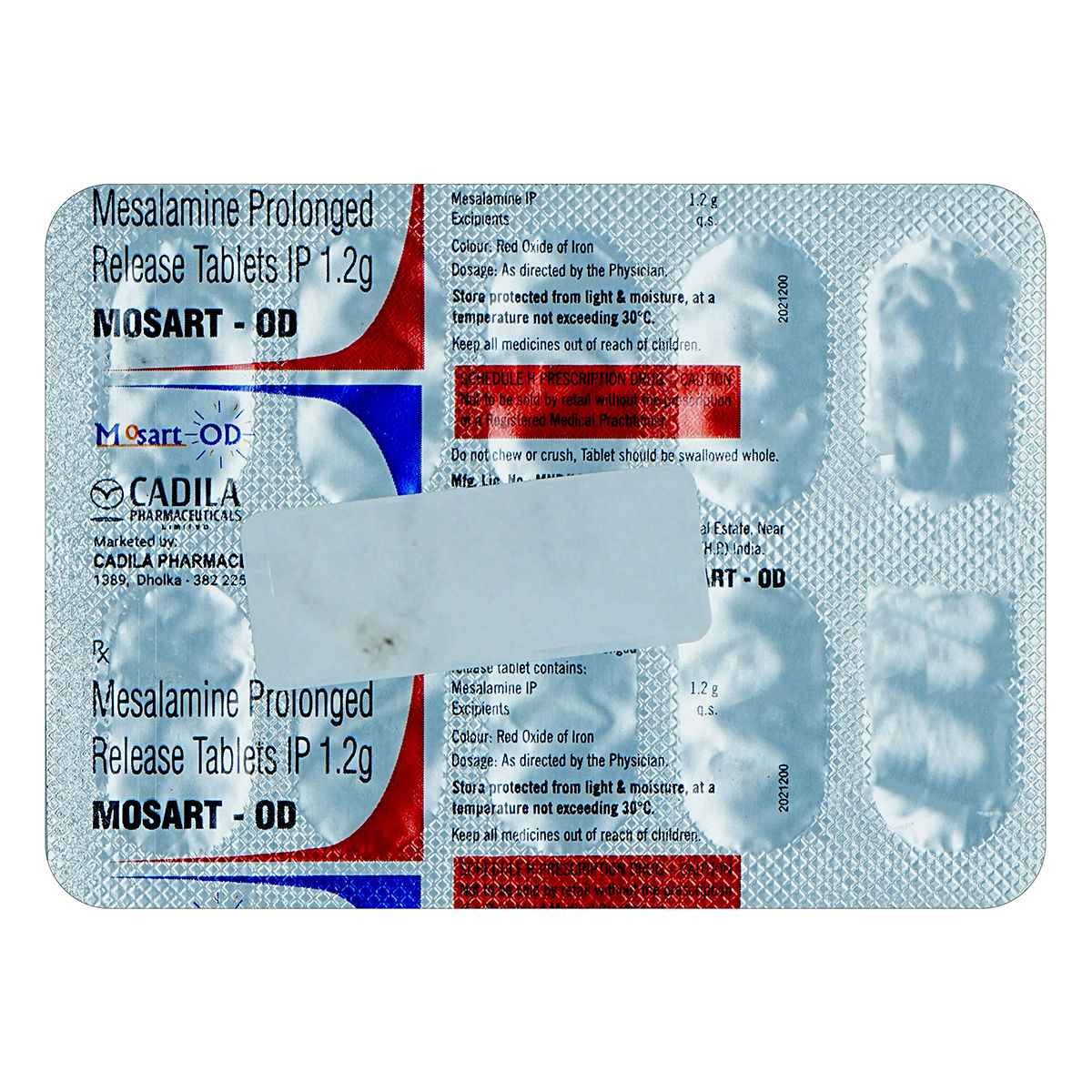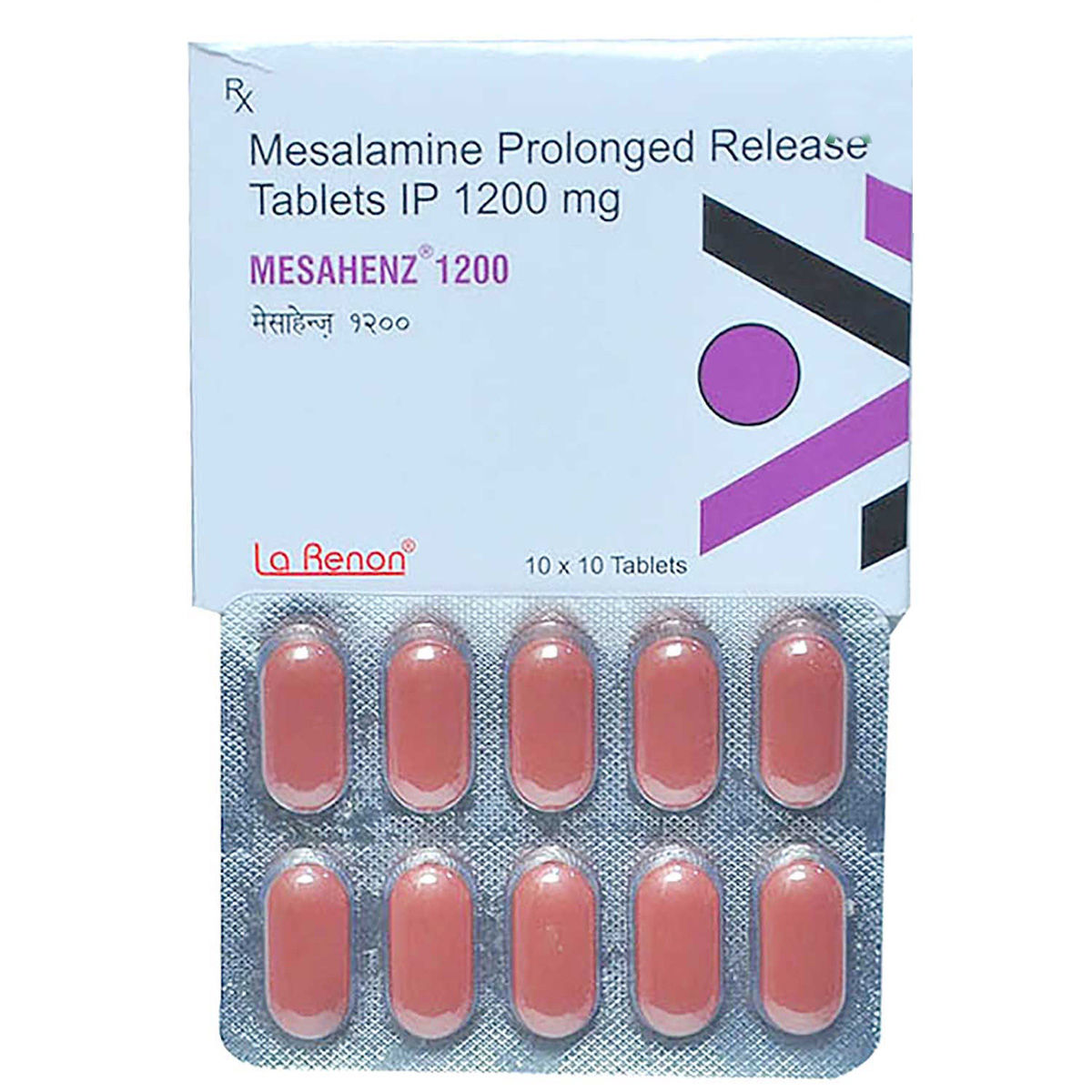Mesalamine
About Mesalamine
Mesalamine is used to treat ulcerative colitis and Crohn’s disease. Ulcerative colitis is a type of chronic inflammatory bowel disease that causes inflammation of the large intestine lining (colon). It produces ulcers on the colon's lining, which may cause bleeding and discharge of pus and mucus.
Mesalamine contains Mesalamine, which works by inhibiting the production of certain chemical substances, such as prostaglandins, that cause pain and swelling.
In some cases, you may experience diarrhoea, stomach pain, headache, nausea, vomiting or flatulence (gas). Most of these side effects of Mesalamine do not require medical attention and gradually resolve over time. However, if the side effects persist or worsen, please consult your doctor.
Take Mesalamine as prescribed. You are advised to use Mesalamine for as long as your doctor recommends it, based on your medical condition. It should be taken one hour before food or 2 hours after food. Do not take more than the recommended dose of medicine.
Inform your doctor if you are allergic to any components present in Mesalamine. Mesalamine should be used with caution in the elderly. If you are pregnant or breastfeeding, please inform your doctor before taking Mesalamine. Avoid taking Mesalamine if you have severe kidney failure. If you have stomach pain, cramps, severe headache, fever or rash, after taking Mesalamine, stop taking it immediately and consult a doctor.
Uses of Mesalamine
Medicinal Benefits
- Mesalamine contains Mesalamine, an anti-inflammatory drug used to treat ulcerative colitis and Crohn’s disease.
- This medicine helps reduce inflammation (redness and swelling) in the intestines and provides relief from symptoms such as stomach pain or bleeding.
- Mesalamine may also prevent further episodes of ulcerative colitis.
Directions for Use
• Mesalamine can be taken 1 hour before or 2 hours after meals. • It is usually taken 3-4 times a day or as prescribed by your doctor. • Swallow the whole Mesalamine with a glass of water. • Do not crush, chew, or break it.
Storage
Side Effects of Mesalamine
- Diarrhoea
- Stomach pain
- Headache
- Nausea
- Vomiting
- Flatulence (gas)
Drug Warnings
- Inform your doctor if you're allergic to any ingredient in the Mesalamine.
- Mesalamine should be used with caution in the elderly.
- Avoid taking Mesalamine if you have severe kidney failure.
- Severe skin reactions such as toxic epidermal necrolysis (skin peeling and blistering) or Stevens-Johnson syndrome (a painful rash that spreads and blisters) can occur in some patients taking Mesalamine. Therefore, if you notice any skin reactions while taking Mesalamine, please consult a doctor immediately.
- If you are pregnant or breastfeeding, inform your doctor before taking Mesalamine.
- If you have stomach pain, cramps, severe headache, fever or rash, stop taking Mesalamine immediately and consult a doctor.
- Avoid taking Mesalamine if you have had blood abnormalities or kidney problems while taking other medicines such as sulfasalazine.
Drug Interactions
Drug-Drug Interactions: Mesalamine may interact with a laxative (lactulose), painkillers (aspirin, ibuprofen), immunosuppressants (azathioprine), or chemotherapy drugs (thioguanine, mercaptopurine).
Drug-Food Interactions: No interactions found.
Drug-Disease Interactions: If you have a stomach ulcer, a blockage in the stomach, asthma, or any medical condition that can cause bleeding, liver, kidney, or blood problems, inform your doctor before taking Mesalamine.
Drug-Drug Interactions Checker List:
Safety Advice

Alcohol
cautionIt is unknown whether it is safe to consume alcohol with Mesalamine. However, as a precautionary measure, it is advisable not to take or limit alcohol.

Pregnancy
consult your doctorMesalamine should not be used in pregnancy unless necessary. So, inform your doctor if you are pregnant or suspect pregnancy.

Breast Feeding
consult your doctorMesalamine should not be used in nursing mothers unless necessary. So, inform your doctor if you are a nursing mother.

Driving
safe if prescribedMesalamine usually does not affect your ability to drive or operate machinery.

Liver
consult your doctorLimited information is available about using Mesalamine in patients with liver disease. Inform your doctor before taking Mesalamine if you have a history of liver disease

Kidney
cautionInform your doctor before taking Mesalamine if you have a history of kidney diseases/conditions. Mesalamine should be used with extreme caution in patients with mild to moderate kidney impairment. It is recommended not to take Mesalamine if you have severe kidney impairment.

Children
cautionMesalamine is not recommended for use in children below 6 yeras of age as the safety and efficacy for this medicine is not established. For children above 6 years, the physician will recommed it if necessary.
Habit Forming
Diet & Lifestyle Advise
- Maintain a low-fat diet and eat foods rich in vitamin C, such as bell peppers, spinach, parsley, and berries, to help heal faster.
- Include olive oil and omega-3 fatty acids.
- Eat more fibre-rich foods such as fruits and vegetables.
- Limit dairy intake as your body may develop difficulty digesting certain dairy products when affected with Crohn’s disease, leading to stomach cramps, diarrhoea, or stomach upset.
- Drink plenty of water to prevent dehydration.
Special Advise
- Blood and urine tests are recommended before and during the treatment with Mesalamine to monitor the functioning of the kidney, liver, and blood.
Patients Concern
Disease/Condition Glossary
Ulcerative colitis: Ulcerative colitis is a type of chronic inflammatory bowel disease that causes inflammation of the lining of the large intestine (colon) and produces ulcers on the lining of the colon, which may cause bleeding and discharge of pus and mucus. The common symptoms include bloody stools, stomach pain, rectal pain, diarrhoea, fever, or weight loss. Additionally, it may cause other problems such as joint pain or swelling, mouth sores, skin problems, decreased appetite, or nausea. The factors involved in causing ulcerative colitis include immune disorders, environmental factors like viruses, bacteria, or antigens, which may trigger the immune system, and genes inherited from the parent.
Crohn’s disease: Crohn’s disease is a type of chronic inflammatory bowel disease that can affect any part of the gastrointestinal tract, from mouth to anus. But mostly occurs in the small intestine and large intestine. The symptoms include blood in stools, stomach cramps, tiredness, diarrhoea, fever, weight loss, or loss of appetite.
FAQs
Mesalamine is used to treat Ulcerative colitis and Crohn's disease.
Mesalamine works by inhibiting the production of certain chemical substances, such as prostaglandins, that cause pain and swelling. Thus, it helps reduce inflammation (swelling) in the intestines and relieves stomach pain or bleeding symptoms.
You are not recommended to take Mesalamine with Ibuprofen as co-administration of these two medicines may increase the risk of kidney problems. However, please consult your doctor before taking Mesalamine with other medicines.
Yes, Mesalamine may cause kidney stones in some patients. It is not necessary for everyone taking Mesalamine to experience this side effect. However, if you notice blood in urine or pain in the sides of the stomach, please consult a doctor immediately. Drink adequate water while taking Mesalamine to prevent kidney stones.
Mesalamine should be used with caution in patients with stomach ulcers as it may increase the risk of worsening the condition. Therefore, please inform your doctor if you have a stomach ulcer before taking Mesalamine.
Some people may develop lactose intolerance (inability to digest lactose) when affected by Crohn's disease. Therefore, it is recommended to avoid dairy products if you have Crohn's disease as it may lead to adverse effects such as diarrhoea, stomach cramps, or stomach upset.
Yes, Mesalamine may cause diarrhoea as a common side effect. However, if the condition persists and worsens with fever, watery stools, or consistent stomach pain, please consult a doctor. Also, drink plenty of water while taking Mesalamine to prevent dehydration.
Mesalamine should be taken for as long as it has been prescribed by the doctor. The doctor wil determine the duration of the treatment based on your condition.
Do not discontinue Mesalamine without consulting your doctor. Discuss with your doctor first if you have any concerns as stopping Mesalamine might cause your symptoms to come back.
No, Mesalamine is not habit-forming and does not cause addiction.
It is unknown if alcohol interacts with Mesalamine. Please consult the doctor before drinking alcohol while taking Mesalamine.
Mesalamine might cause joint pain. Consult the doctor if you experience severe joint pain or if the condition persists.
Take Mesalamine 1 hour before or 2 hours after meals.
Side effects of Mesalamine include diarrhoea, stomach pain, headache, nausea, vomiting or flatulence (gas). If the side effects persist or worsen, please consult your doctor.










